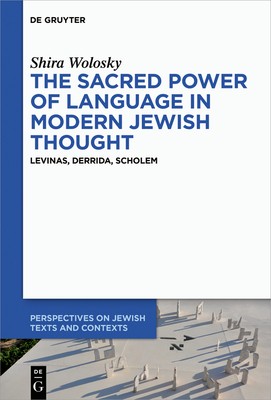
- We will send in 10–14 business days.
- Author: Shira Wolosky
- Publisher: De Gruyter
- ISBN-10: 3111168638
- ISBN-13: 9783111168630
- Format: 15.6 x 23.4 x 1.8 cm, hardcover
- Language: English
- SAVE -10% with code: EXTRA
The Sacred Power of Language in Modern Jewish Thought (e-book) (used book) | bookbook.eu
Reviews
Description
Judaic cultures have a commitment to language that is exceptional. Language in many form - texts, books and scrolls; learning, interpretation, material practices that generate material practices - are central to Judaic conduct, experience, and spirituality. In this Judaic traditions differ from philosophical and theological ones that make language secondary. Traditional metaphysics has privileged the immaterial and unchanging, as unchanging truth that language can at best convey and at worst distort. Such traditional metaphysics has come under critique since Nietzsche in ways that the author explores. Shira Wolosky argues that Judaic traditions converge with contemporary metaphysical critique rather than being its target. Focusing on the work of Derrida, Levinas, Scholem and others, the author examines traditions of Judaic interpretation against backgrounds of biblical exegesis; sign-theory as it recasts language meaning in ways that concord with Judaic textuality; negative theology as it differs in Judaic tradition from those which negate language itself; and lastly outline a discourse ethics that draws on Judaic language theory.
This study is directed to students and scholars of: Judaic thought, religious studies and theology; theory of interpretation; Levinas and other modern Jewish philosophical writers, placing them in broader contexts of philosophy, theology, and language theory. It is shown how Jewish discourses on language address urgent problems of value and norms in the contemporary world that has challenged traditional anchors of truth and meaning.
EXTRA 10 % discount with code: EXTRA
The promotion ends in 15d.17:53:23
The discount code is valid when purchasing from 10 €. Discounts do not stack.
- Author: Shira Wolosky
- Publisher: De Gruyter
- ISBN-10: 3111168638
- ISBN-13: 9783111168630
- Format: 15.6 x 23.4 x 1.8 cm, hardcover
- Language: English English
Judaic cultures have a commitment to language that is exceptional. Language in many form - texts, books and scrolls; learning, interpretation, material practices that generate material practices - are central to Judaic conduct, experience, and spirituality. In this Judaic traditions differ from philosophical and theological ones that make language secondary. Traditional metaphysics has privileged the immaterial and unchanging, as unchanging truth that language can at best convey and at worst distort. Such traditional metaphysics has come under critique since Nietzsche in ways that the author explores. Shira Wolosky argues that Judaic traditions converge with contemporary metaphysical critique rather than being its target. Focusing on the work of Derrida, Levinas, Scholem and others, the author examines traditions of Judaic interpretation against backgrounds of biblical exegesis; sign-theory as it recasts language meaning in ways that concord with Judaic textuality; negative theology as it differs in Judaic tradition from those which negate language itself; and lastly outline a discourse ethics that draws on Judaic language theory.
This study is directed to students and scholars of: Judaic thought, religious studies and theology; theory of interpretation; Levinas and other modern Jewish philosophical writers, placing them in broader contexts of philosophy, theology, and language theory. It is shown how Jewish discourses on language address urgent problems of value and norms in the contemporary world that has challenged traditional anchors of truth and meaning.


Reviews